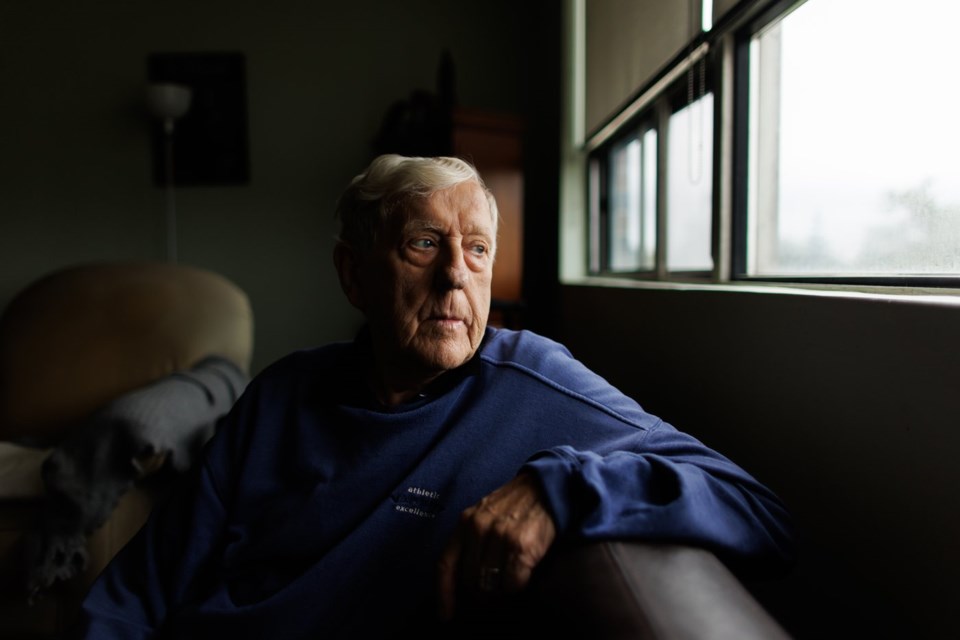OTTAWA — A man who says he suffers from chronic and worsening mental health issues is among those launching a court challenge of the federal government's assisted dying law, which excludes people suffering solely from a mental disorder.
An application filed by Dying with Dignity in Ontario Superior Court on Monday argues that it is discriminatory to bar people with mental disorders from being eligible for an assisted death when it is available to people who suffer physically.
The organization is asking the court to immediately quash the mental-health exclusion.
Plaintiff John Scully said going to court is his last hope.
No medication, treatment or therapy has eased the post-traumatic stress disorder the former war correspondent suffers from, along with depression and anxiety. All are made worse by sleep deprivation.
"In the last 36 hours, I've had four hours (of) sleep," he said in a recent interview. "And the sleep is polluted with nasty, vicious nightmares."
At 83, Scully said his condition is worsening by the day, not only mentally but physically.
"I feel it's incumbent on me to rattle whatever cage I can, to say, not 'Look at me,' but 'Look at us.' For God's sake. Do something about it."
The Liberal government announced in February it would delay a planned expansion to the assisted-dying regime that would have allowed people with mental disorders to be considered starting in March. The expansion has been delayed until 2027.
The government cited readiness concerns from provinces and outstanding questions from psychiatrists about how clinicians could determine whether someone's mental illness could be cured.
Dying with Dignity, Scully and a third plaintiff, Claire Elyse Brosseau, argue the mental-health exclusion violates Section 7 of the Canadian Charter of Rights and Freedoms, which says people have the right to life, liberty and security.
"There is no constitutional justification for the prolongation of the enduring and intolerable suffering of those Canadians who are eligible for MAID but for the mental-illness exclusion," the documents state.
The filing argues people with severe and incurable mental disorders have been deprived of their security, forced instead to endure prolonged suffering, and the liberty to make the deeply personal decision to end their life.
The right to equality under the law is also violated, Dying with Dignity argues.
The Liberal government passed its assisted-dying law in 2016 and updated it after a 2019 Quebec lower court ruling found it was unconstitutional to require that a person's death be reasonably foreseeable to make them eligible.
In 2021, the government passed another updated law that included a Senate amendment to remove the exclusion for those who suffer solely from a mental disorder. Senators behind the amendment had argued the exclusion was discriminatory.
People with intolerable mental disorders were initially supposed to be able to be assessed for an assisted death beginning in March 2023. Months before the change was to take effect, the government announced it would legislate a one-year delay to give clinicians more time to be trained.
As the March 2024 deadline approached, a joint parliamentary committee of senators and members of Parliament held hearings into the scheduled expansion, which exposed deep divides on the issue across legal and medical lines, and recommended another postponement.
Ultimately, the government legislated a three-year delay, which Health Minister Mark Holland and Justice Minister Arif Virani said was necessary to address the concerns from provinces and to provide additional time for training.
Proponents of the expansion argued against the delay, saying that training materials had been developed and clinicians who already assess patients for assisted dying said they were ready.
At the time, Holland reiterated the government's position that mental suffering is equivalent to physical suffering and said he expects the provinces to get ready.
Conservative Leader Pierre Poilievre has pledged to scrap the expansion altogether if his party forms government in the next election.
Helen Long, the CEO of Dying with Dignity Canada, said it's disappointing to have to turn to the courts to force the government to enact its own legislation.
She believes the delays are rooted in a lack of "political will."
Holland and Virani's offices did not immediately respond to a request for comment.
Long said her organization has heard from people and families about the hardship caused by the repeated delays.
"The fact that they have been forced to wait and then given a promise and given a promise and given a promise — that's what makes it so difficult for them to continue to soldier on and wait for an assessment," she said.
"They're owed that ability to apply."
Scully says the sleep deprivation he suffers from is pushing his mental condition and other ailments over the edge, causing him to live in constant fear that he will commit suicide. He has attempted to take his own life twice before.
"Every day it gets a little closer," Scully said. "I don't want to, because I know the horror and the grief it causes the survivors. Death by suicide is awful, just awful, for the ones left behind."
Long anticipates the court process will be lengthy, but said advancing it opens the door for people like Scully to be assessed once it is heard.
Scully said he was interviewed by two clinicians who assess patients for assisted dying and he would be eligible if the expansion had already been in place.
"It's really sobering. It's for real. It kind of takes your breath away."
This report by The Canadian Press was first published Aug 19, 2024.
— With files from Laura Osman
Stephanie Taylor, The Canadian Press




